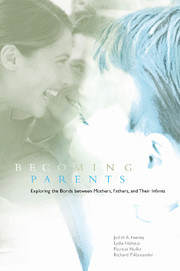Book contents
- Frontmatter
- Contents
- Preface
- 1 The Transition to Parenthood
- 2 Attachment in Childhood and Beyond
- 3 The Study
- 4 The Couples
- 5 Pregnancy and Plans for Birth
- 6 Couples' Experiences of Birth and New Parenthood
- 7 How Does New Parenthood Affect Couples?
- 8 Dealing with Depression
- 9 Men, Women, and Household Work: The Diaries
- 10 Couples' Changing Attachment Relationships
- 11 Six Months into Parenting
- 12 New Parenthood in Perspective
- Appendix A Core Questionnaires Completed by Couples
- Appendix B Summary of Sample Characteristics
- Appendix C Summary of Major Statistical Analyses
- References
- Author Index
- Subject Index
5 - Pregnancy and Plans for Birth
Published online by Cambridge University Press: 05 June 2012
- Frontmatter
- Contents
- Preface
- 1 The Transition to Parenthood
- 2 Attachment in Childhood and Beyond
- 3 The Study
- 4 The Couples
- 5 Pregnancy and Plans for Birth
- 6 Couples' Experiences of Birth and New Parenthood
- 7 How Does New Parenthood Affect Couples?
- 8 Dealing with Depression
- 9 Men, Women, and Household Work: The Diaries
- 10 Couples' Changing Attachment Relationships
- 11 Six Months into Parenting
- 12 New Parenthood in Perspective
- Appendix A Core Questionnaires Completed by Couples
- Appendix B Summary of Sample Characteristics
- Appendix C Summary of Major Statistical Analyses
- References
- Author Index
- Subject Index
Summary
“I nearly fell over! It was a happy surprise, though, because we'd just started talking about kids and I wanted to start having children soon.”
Once couples had expressed an interest in taking part in the study, we contacted them by phone and arranged for a research assistant to interview them in their own homes. Conducting these home visits minimized the inconvenience to the couples, and allowed them to be interviewed in a familiar and relatively relaxed setting. The research assistant first chatted with the couple informally, talking briefly about the purpose and procedures of the study, and answering any questions they raised.
The interview itself then took place, and was tape-recorded so that we had an accurate record of spouses' responses. Husbands and wives were interviewed together, as a couple, with the interview usually taking place at the dining room table or in the lounge room. Although all the couples agreed to have their interviews audiotaped, there were a few cases in which technical problems prevented us from obtaining a usable record (100 interviews were recorded successfully).
At this first interview with the transition couples, we were interested in hearing their thoughts and feelings about the pregnancy. Our questions focused on four broad issues: planning and decision making in relation to the pregnancy, reactions to the news of impending parenthood, experiences of pregnancy itself, and plans for the birth and beyond.
PLANNING AND DECISION MAKING
The amount of planning and deliberation that precedes a pregnancy varies, of course, from couple to couple (as we discussed in Chapter 1).
- Type
- Chapter
- Information
- Becoming ParentsExploring the Bonds between Mothers, Fathers, and their Infants, pp. 72 - 87Publisher: Cambridge University PressPrint publication year: 2001



